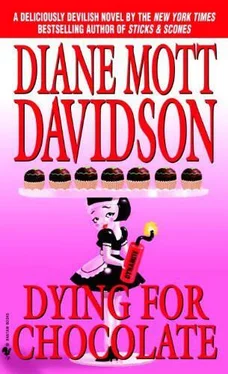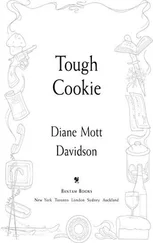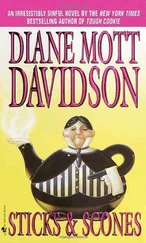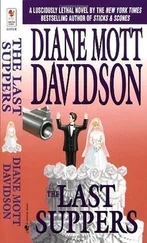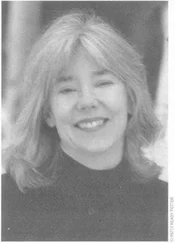To my surprise I was able to put him on hold and press the intercom button to search out the general. He was not in the house. I got back on the line with the choirmaster.
“I don’t know when she’ll be back,” I said, then imprudently added, “I didn’t know there were any Episcopal churches in Utah.”
The choirmaster yelled, “Listen! I need to know if she got fifty copies of Songs of Praise!”
I said, “This is not something I know about.” Nor did I know why I expected someone who worked for the church to be civil, if not Christian.
“And who are you?” he asked.
“The cook.”
There was a silence, then a groan. Would Adele please call as soon as possible? You bet, I said, and hung up.
Schulz was standing in the hall perusing the panel of buttons that controlled the house security system.
“Neighbor?” he asked without looking at me.
“I wish. It was for Adele. The general’s wife.”
“Should I have heard of her, too?”
“I don’t think so. Remember my friend Marla? Her sister.”
Schulz looked up the stairwell, then at the panel of security buttons. “You’ve got four loops here,” he said. “What—fire, perimeter, back door, first-floor motion detector?”
“Very good,” I said wearily, then added, “I feel awful.”
Schulz put his arm around my shoulders and guided me back out to the kitchen.
“Did I hear you correctly?” he asked as he gave me his patented Santa Claus half-grin. “Do I remember Marla? How could I forget? My ears still haven’t recovered. Why don’t we get Miss Yakkety-Yak over here to be with you?”
I said something vaguely affirmative and Schulz began to paw through the kitchen desk until a phone book presented itself. Muttering under his breath, he stared at the phone with its many buttons, frowned, and then punched. His voice murmured into the phone, echoed off the surfaces of the shiny pots and pans, and reverberated from the brilliant counter tiles. I looked around the kitchen but then closed my eyes. Everything seemed too bright.
With my eyes shut, I tried to look inward. What was I feeling? Nothing. Absolutely nothing.
“Twenty minutes,” said Schulz after he hung up. And then without asking he moved around the kitchen opening more cabinets until he found some tea. He set about boiling water and heating a pot. Eventually he poured steaming amber liquid into thin porcelain cups. The soothing fragrance of Earl Grey tea filled the kitchen. When I thanked Schulz there was a catch in my voice.
He settled onto a barstool and we drank in silence. Only the distant yells of General Bo and Julian punctuated the silence.
“Goldy,” Schulz said finally with that half-smile of his, “tell me more about your general.”
I tsked and sighed. “He was in Afghanistan,” I said, “role of observer or something. Before that he was a demolitions guy.”
Schulz let out a low whistle. “It’s coming back. He’s the guy, taught the Afghanis how to blow up Soviet tanks with rocket-propelled grenades they’d captured. He was the guy! I knew I’d seen him on TV.”
I turned back to my tea. “Nobody could figure out where the Afghanis were getting their recoilless rifles and C4, which is an explosive used by terrorists.”
Schulz smiled. “Thanks. I know what C4 is.”
I shrugged. “Anyway,” I said, “General Bo wasn’t talking. Maybe the army didn’t want him to give specifics. Marla said Bo was supposedly involved with the black market for explosives. Now he’s a civilian and he consults. He experiments. If he survives, he writes about it.” I stopped talking, exhausted by the effort.
“I don’t know if I’d want to be living on the top floor of a house belonging to a former demolitions expert. Emphasis on the former.”
“Thanks loads.”
“Now tell me about John Richard Korman.”
I sipped tea, tried to think of how to put this so it wouldn’t seem like such a big deal. I had told neither Philip Miller nor Tom Schulz—until our ride over here today—about The Jerk’s behavior last month or how it had frightened me. Why discuss John Richard’s behavior? Philip would have tried to explain it and Schulz would have tried to stop it.
Philip. The name brought pain.
I said, “I told you. John Richard was driving by every night. Hassling me about money, about seeing Arch. For about a month.”
“Did you report it?”
I shook my head.
Schulz said, “Did you do anything ?”
I said, more sharply than I meant to, “I divorced him, didn’t I? I moved, didn’t I? I’m getting a security system for my house, okay?”
“Look,” he said, “we’ve got a weird call and now a death. Someone you knew. You’ve got a violent ex with a bad family history. I want you to stay in touch with me. You’re not safe. Do you understand?”
I nodded, numb.
The security gate buzzed: Marla, thank God. I looked at my watch. 2:30. Hard to believe. Events and conversations were flowing together, out of my control.
Marla arrived at the front door wearing one of her sequined and feathered sweat suits. Here and there jeweled barrettes held her fluffy brown hair. She looked like a plump exotic bird. In her hands were shopping bags. These were undoubtedly filled with ready-to-eat gourmet delicacies hastily purchased to relieve me from cooking. My heart warmed at the sight of her.
“Oh Goldy, God, I don’t believe this,” she said when she had heaved the bags onto the foyer floor. Her capacious arms circled me. “Are you okay?”
I lifted my chin from her shoulder and said, “No.”
“I’ll bet. Where’s Adele?”
“At a meeting.”
From behind us, Schulz said, “I’m off.”
I pulled away. “No, wait—”
Marla, sensing discomfort in the air, scooped up the grocery bags and mumbled about getting things into the kitchen. Schulz and I walked out the front door.
Birds squawked and flitted between the pines. The sun was warm. A bird darted into a well of sunlight and flashed a white underbelly. It was getting on to late afternoon. Snow melted noisily all around us as we made our way to the car. Tree branches dripped and the earth sucked and popped in absorbing the wet. Here and there on the lawn and in the general’s new flower pots were clods of dirt that had been blown over the roof by the backyard garden-explosion. At Schulz’s car, I thanked him for bringing me home. Avoiding his eyes, I said, “You’ve been kind. Thanks.”
He waited for me to say more, to say something about seeing him again or wanting to. But I did not.
He said, “Goldy?”
“Yes?”
“Call me if you want to talk about the accident. Or anything else.”
“You need to come home,” Marla was saying into the kitchen phone when I returned. She hung up. “Adele,” she explained, rolling her eyes. “Wanted to know why I was answering the phone in her house, so I told her about you and Philip and the accident. Talk about stunned. She was speechless.”
“Where was she?”
“Still at Elk Park Prep. My sister, the storm-trooper fund-raiser. It’s like putting General Bo into one of those paint-pellet games. God help the school.” She paused for a moment, then pulled a clear plastic container filled with salad from one of the bags. “Speaking of Bo,” she said, “I bought something that sounds like a uniform. Field greens? Think you can get them on the black market, too? Anybody done a study of terrorist food?”
I turned to her with my mouth open. “Field greens?” I didn’t get it. Suddenly the absurdity of everything swept over me. I gagged. Marla reached out to hold me.
“It’s okay,” she said.
Firmly, Marla sat me down. With the efficiency I admired so much in her, she made some espresso. She knew I loved the stuff, and she even remembered not to ruin it with lemon peel or sugar. I liked it better than tea anyway. When she set the tiny cup down, she glanced out back.
Читать дальше
